Cambodia's Khmer Rouge defendants deny charges
10-30-2013
Thursday, October 31, 2013
The Center for Holocaust and Genocide Studies is grieved by the loss of Myron Kunin
It was Myron's passion for art that brought him together with Stephen Feinstein. Together they curated Witness and Legacy, a major commemorative art exhibition to mark the 50th anniversary of the liberation of Auschwitz that debuted in St. Paul in 1995 and traveled until 2002. That collaboration began the friendship and vision that lead to the founding of our Center in 1997.
We will honor Myron's his legacy as we strive to fulfill our mission of educating all sectors of society about the Holocaust and other genocides.
May his memory be a blessing on us all.
We will honor Myron's his legacy as we strive to fulfill our mission of educating all sectors of society about the Holocaust and other genocides.
May his memory be a blessing on us all.
Labels:
"Holocaust and Genocide studies",
homepage,
Kunin
Wednesday, October 30, 2013
Special Screening: A Film Unfinished with Producer Noemi Schory
Tuesday, November 12, 2013
7:00 p.m.
St. Anthony Main Theatre
Tickets: $5.00
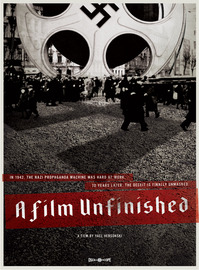
A FILM UNFINISHED is a film of enormous import, documenting some of the worst horrors of our time and exposing the efforts of its perpetrators to propel their agenda and cast it in a favorable light.
At the end of WWII, 60 minutes of raw film, having sat undisturbed in an East German archive, was discovered. Shot by the Nazis in Warsaw in May 1942, and labeled simply "Ghetto," this footage quickly became a resource for historians seeking an authentic record of the Warsaw Ghetto. However, the later discovery of a long-missing reel, inclusive of multiple takes and cameraman staging scenes, complicated earlier readings of the footage.
The documentary presents the raw footage in its entirety, carefully noting fictionalized sequences (including a staged dinner party) falsely showing "the good life" enjoyed by Jewish urbanites, and probes deep into the making of a now-infamous Nazi propaganda film.
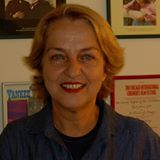
Noemi Schory is currently the Schusterman Visiting Artist-in-Residence at the University of Minnesota throughout Fall Semester 2013. A renowned documentary film director and producer, she is active in Israeli and many international co-productions, primarily in the documentary field.
A Film Unfinished, which she produced, has received numerous awards worldwide and was an nominated for an Emmy after it aired on PBS in 2010. In 2005, Schory was elected president of Input, the international public television conference. She also serves as a museum film director and producer for Yad Vashem, Israel's official memorial for the Jewish victims of the Holocaust.
To view the trailer click here.
Sponsored by the Center for Holocaust and Genocide Studies, The Center for Austrian Studies, European Studies Consortium, Center for Jewish Studies, The Film Society of Minneapolis/St. Paul, Jewish Community Relations Council
7:00 p.m.
St. Anthony Main Theatre
Tickets: $5.00

A FILM UNFINISHED is a film of enormous import, documenting some of the worst horrors of our time and exposing the efforts of its perpetrators to propel their agenda and cast it in a favorable light.
At the end of WWII, 60 minutes of raw film, having sat undisturbed in an East German archive, was discovered. Shot by the Nazis in Warsaw in May 1942, and labeled simply "Ghetto," this footage quickly became a resource for historians seeking an authentic record of the Warsaw Ghetto. However, the later discovery of a long-missing reel, inclusive of multiple takes and cameraman staging scenes, complicated earlier readings of the footage.
The documentary presents the raw footage in its entirety, carefully noting fictionalized sequences (including a staged dinner party) falsely showing "the good life" enjoyed by Jewish urbanites, and probes deep into the making of a now-infamous Nazi propaganda film.

Noemi Schory is currently the Schusterman Visiting Artist-in-Residence at the University of Minnesota throughout Fall Semester 2013. A renowned documentary film director and producer, she is active in Israeli and many international co-productions, primarily in the documentary field.
A Film Unfinished, which she produced, has received numerous awards worldwide and was an nominated for an Emmy after it aired on PBS in 2010. In 2005, Schory was elected president of Input, the international public television conference. She also serves as a museum film director and producer for Yad Vashem, Israel's official memorial for the Jewish victims of the Holocaust.
To view the trailer click here.
Sponsored by the Center for Holocaust and Genocide Studies, The Center for Austrian Studies, European Studies Consortium, Center for Jewish Studies, The Film Society of Minneapolis/St. Paul, Jewish Community Relations Council
Tuesday, October 29, 2013
Vespers in Remembrance
The Elm Ensemble
Gary Wolfman, guest conductor
Bach's Cantata 106 and Schütz's Aus der Tiefe on the occasion of the 75th anniversary of Kristallnacht
Sunday, November 10
4:30 p.m.
Christ Church Lutheran
Gary Wolfman, guest conductor
Bach's Cantata 106 and Schütz's Aus der Tiefe on the occasion of the 75th anniversary of Kristallnacht
Sunday, November 10
4:30 p.m.
Christ Church Lutheran
Labels:
Bach,
Community Events,
Kristallnacht,
Music
Exclusive Twin Cities Premiere: BESA:The Promise
Muslims who saved Jews in World War II
Introduction by Dr. Daniel Schroeter, University of Minnesota
Saturday, November 9, 2013
7:00 p.m.
St. Anthony Main Theatre
Tickets: $5.00
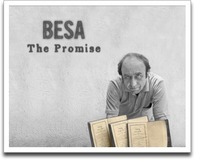
BESA:The Promise weaves Albania's heroism in WWII through the vérité journeys of two men. One is Norman Gershman, a renowned Jewish-American photographer determined to document first-person accounts of the Albanian Muslims who rescued Jews during the Holocaust. The other is Rexhep Hoxha, a Muslim-Albanian. Rexhep must fulfill the promise made to a Jewish family his father rescued during the Holocaust and return to them a set of Hebrew books they left behind. And Rexhep's promise is more than words - it's part of his besa - an honor code that, among other things, pledges all Albanians to offer safe harbor to refugees.
More than seven years in the making, Besa: The Promise presents a powerful human drama compounded by a devastating twist. It is a story that that bridges generations and religions ... uniting fathers and sons ... Muslims and Jews.
To view the trailer click here.
Sponsored by: The Center for Holocaust and Genocide Studies, Center for Austrian Studies, European Studies Consortium, Center for Jewish Studies, The Film Society of Minneapolis/St. Paul, Jewish Community Relations Council.
Introduction by Dr. Daniel Schroeter, University of Minnesota
Saturday, November 9, 2013
7:00 p.m.
St. Anthony Main Theatre
Tickets: $5.00

BESA:The Promise weaves Albania's heroism in WWII through the vérité journeys of two men. One is Norman Gershman, a renowned Jewish-American photographer determined to document first-person accounts of the Albanian Muslims who rescued Jews during the Holocaust. The other is Rexhep Hoxha, a Muslim-Albanian. Rexhep must fulfill the promise made to a Jewish family his father rescued during the Holocaust and return to them a set of Hebrew books they left behind. And Rexhep's promise is more than words - it's part of his besa - an honor code that, among other things, pledges all Albanians to offer safe harbor to refugees.
More than seven years in the making, Besa: The Promise presents a powerful human drama compounded by a devastating twist. It is a story that that bridges generations and religions ... uniting fathers and sons ... Muslims and Jews.
To view the trailer click here.
Sponsored by: The Center for Holocaust and Genocide Studies, Center for Austrian Studies, European Studies Consortium, Center for Jewish Studies, The Film Society of Minneapolis/St. Paul, Jewish Community Relations Council.
Labels:
"World War II",
Albania,
Community Events,
Film,
Holocaust,
Jews,
Muslims
Monday, October 28, 2013
History, Memory and Pedagogy
An Educator Workshop on the Occasion of the 75th Anniversary of Kristallnacht
November 9, 2013
9:00 a.m. - 2:00 p.m.
115 Blegen Hall
Free and open to educators K-16
Registration required by clicking here.
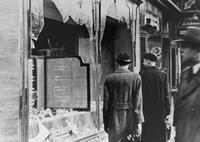
This one-day professional development workshop is a follow-up to the Holocaust in European Memory Summer Institute that took place on July 8-11, 2013 at the University of Minnesota. That workshop examined questions such as how the Nazi murder of European Jews became "The Holocaust." How the story is conveyed through public memorials, school curricula, art, literature and film. How the Holocaust has been contextualized and rendered meaningful within the diversity of European nations and in the distant US.
We will continue the discussions we started this summer by exploring the specific connections between history, memory and education in the contemporary world. We will examine history and memory as it deals with the genocide of the Roma, communal gatherings and ceremonies dedicated to commemorate the Holocaust and reflections on the 75th anniversary of Kristallnacht, which is considered the official catalyst for the Holocaust. ( Attendance at the July institute is not required for the November 9, workshop.)
Introduction
Kristallnacht and the Duties of Memory: Remarks Alejandro Baer
Alejandro Baer is the director and Stephen C. Feinstein Chair of the Center for Holocaust and Genocide Studies at the University of Minnesota. He has authored numerous articles addressing issues of genocide, memory, and antisemitism
Lecture
The Roma Genocide and Memory: Lecture by William Duna
William A. Duna is an American Gypsy descended from Hungarian musicians who emigrated to the U. S. in 1893. Duna has taught music, written and performed, and has served as an entertainment consultant. He has written and lectured about the Roma people and was appointed by Ronald Reagan as the first Roma to serve on the United States Holocaust Memorial Museum Council in 1987.
Presentation
"Holocaust Commemorations for the Broader Community"
Presentation by Deborah Petersen-Perlman
Deborah Petersen Perlman Associate Professor Communications, University of Minnesota Duluth and coordinates the Baeumler-Kaplan Holocaust Commemoration.
Sponsored by The Center for Holocaust and Genocide Studies, Institute for Global Studies, European Studies Consortium
November 9, 2013
9:00 a.m. - 2:00 p.m.
115 Blegen Hall
Free and open to educators K-16
Registration required by clicking here.

This one-day professional development workshop is a follow-up to the Holocaust in European Memory Summer Institute that took place on July 8-11, 2013 at the University of Minnesota. That workshop examined questions such as how the Nazi murder of European Jews became "The Holocaust." How the story is conveyed through public memorials, school curricula, art, literature and film. How the Holocaust has been contextualized and rendered meaningful within the diversity of European nations and in the distant US.
We will continue the discussions we started this summer by exploring the specific connections between history, memory and education in the contemporary world. We will examine history and memory as it deals with the genocide of the Roma, communal gatherings and ceremonies dedicated to commemorate the Holocaust and reflections on the 75th anniversary of Kristallnacht, which is considered the official catalyst for the Holocaust. ( Attendance at the July institute is not required for the November 9, workshop.)
Introduction
Kristallnacht and the Duties of Memory: Remarks Alejandro Baer
Alejandro Baer is the director and Stephen C. Feinstein Chair of the Center for Holocaust and Genocide Studies at the University of Minnesota. He has authored numerous articles addressing issues of genocide, memory, and antisemitism
Lecture
The Roma Genocide and Memory: Lecture by William Duna
William A. Duna is an American Gypsy descended from Hungarian musicians who emigrated to the U. S. in 1893. Duna has taught music, written and performed, and has served as an entertainment consultant. He has written and lectured about the Roma people and was appointed by Ronald Reagan as the first Roma to serve on the United States Holocaust Memorial Museum Council in 1987.
Presentation
"Holocaust Commemorations for the Broader Community"
Presentation by Deborah Petersen-Perlman
Deborah Petersen Perlman Associate Professor Communications, University of Minnesota Duluth and coordinates the Baeumler-Kaplan Holocaust Commemoration.
Sponsored by The Center for Holocaust and Genocide Studies, Institute for Global Studies, European Studies Consortium
Wednesday, October 23, 2013
A Lens on History: An Afternoon with Documentary Filmmaker Noemi Schory
Rimon:The Minnesota Jewish Arts Council
Sunday, November 3
3:00 p.m.
Sabes Jewish Community Center
Israeli director and producer Noemi Schory has built a remarkable body of work centered on stories that have emerged from the time period of the Holocaust. In lively discussion with independent filmmaker Emily Goldberg, Schory will reflect on documentary film's fundamental questions - how do you choose to tell a story and construct a point of view? What is the artist's responsibility to her subject, when the story is the Holocaust? The conversation will feature excerpts from Schory's recent films.
Noemi Schory, is currently an artist-in-residence at the University of Minnesota throughout Fall Semester 2013. A renowned documentary film director and producer, Noemi Schory is active in Israeli and many international co-productions, primarily in the documentary field. She produced A Film Unfinished about the Warsaw Ghetto, which received numerous awards worldwide and was an Emmy nominee after being screened on PBS in 2010. In 2005, Schory was elected president of Input, the international public television conference. She also serves as a museum film director and producer for Yad Vashem, Israel's official memorial for the Jewish victims of the Holocaust.
Cost: $12, $10 JCC members, $6 students and seniors
Click here to purchase tickets on-line
Co-Sponsors: Israel Center of the Minneapolis Jewish Federation, Sabes JCC, Rimon, Department of Jewish Studies at the University of MN, and the JCRC of Minnesota & the Dakotas.
Sunday, November 3
3:00 p.m.
Sabes Jewish Community Center
Israeli director and producer Noemi Schory has built a remarkable body of work centered on stories that have emerged from the time period of the Holocaust. In lively discussion with independent filmmaker Emily Goldberg, Schory will reflect on documentary film's fundamental questions - how do you choose to tell a story and construct a point of view? What is the artist's responsibility to her subject, when the story is the Holocaust? The conversation will feature excerpts from Schory's recent films.
Noemi Schory, is currently an artist-in-residence at the University of Minnesota throughout Fall Semester 2013. A renowned documentary film director and producer, Noemi Schory is active in Israeli and many international co-productions, primarily in the documentary field. She produced A Film Unfinished about the Warsaw Ghetto, which received numerous awards worldwide and was an Emmy nominee after being screened on PBS in 2010. In 2005, Schory was elected president of Input, the international public television conference. She also serves as a museum film director and producer for Yad Vashem, Israel's official memorial for the Jewish victims of the Holocaust.
Cost: $12, $10 JCC members, $6 students and seniors
Click here to purchase tickets on-line
Co-Sponsors: Israel Center of the Minneapolis Jewish Federation, Sabes JCC, Rimon, Department of Jewish Studies at the University of MN, and the JCRC of Minnesota & the Dakotas.
Labels:
Community Events,
Film,
Holocaust
Monday, October 21, 2013
2013 Badzin Fellowship winner and PhD Sociology candidate Wahutu Siguru to present at the next HGMV workshop
"The Politics of Representation: Genocide, Mass Violence and Atrocities in the Media."
Wahutu Siguru
Holocaust Genocide & Mass Violence Studies Workshop (HGMV)
Thursday, October 31
3:00 p.m.
Room 710 Social Sciences Building
Wahutu Siguru's project takes a constructivist perspective on knowledge production in an attempt to explicate how knowledge about instances of mass violence, atrocities and genocide is produced and disseminated by the media. It begins from the understanding that representations are based on particular memory, social and knowledge structures leveraging multiple theories to investigate the effects of these on representations. This particular project is the first step towards a larger project that investigates differences and similarities in narratives about Rwanda and Darfur by the media in multiple countries within and outside of Africa.
Siguru's research interests are in the Sociology of Media, Genocide, Mass Violence and Atrocities (specifically on issues of representation of conflicts in Africa such as Darfur and Rwanda), Collective Memory, and perhaps somewhat tangentially Democracy and Development in Africa.
The workshop was founded in 2012 to foster interdisciplinary conversations on the subject areas of Holocaust studies, genocide and memory, peace and conflict studies, human rights, nationalism and ethnic violence, representations of violence and trauma, conflict resolution, transitional justice, historical consciousness and collective memory.
For more information about participation in the workshop please email Wahutau Siguru at siguru@umn.edu.
Wahutu Siguru
Holocaust Genocide & Mass Violence Studies Workshop (HGMV)
Thursday, October 31
3:00 p.m.
Room 710 Social Sciences Building
Wahutu Siguru's project takes a constructivist perspective on knowledge production in an attempt to explicate how knowledge about instances of mass violence, atrocities and genocide is produced and disseminated by the media. It begins from the understanding that representations are based on particular memory, social and knowledge structures leveraging multiple theories to investigate the effects of these on representations. This particular project is the first step towards a larger project that investigates differences and similarities in narratives about Rwanda and Darfur by the media in multiple countries within and outside of Africa.
Siguru's research interests are in the Sociology of Media, Genocide, Mass Violence and Atrocities (specifically on issues of representation of conflicts in Africa such as Darfur and Rwanda), Collective Memory, and perhaps somewhat tangentially Democracy and Development in Africa.
The workshop was founded in 2012 to foster interdisciplinary conversations on the subject areas of Holocaust studies, genocide and memory, peace and conflict studies, human rights, nationalism and ethnic violence, representations of violence and trauma, conflict resolution, transitional justice, historical consciousness and collective memory.
For more information about participation in the workshop please email Wahutau Siguru at siguru@umn.edu.
International Symposium Erasures: Gender, Violence and Human Rights
Thursday, October 24 & Friday, October 25
9:00a.m. to 5:00p.m.
PLENARY SPEAKER
The Story of a Fight Against Human Trafficking in Argentina
Susana Trimarco - Activist against Human Trafficking in Argentina
Thursday, October 24, 3:30p.m.
Maroon and Gold Rooms, McNamara Alumni Center
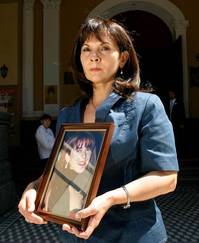
The symposium will address violence against women as a human rights violation, the erasure of gender violence in cultural debates about human rights, and the epistemic revolts of the rethinking of violence from a gender perspective.
Thirteen national and international scholars will address the most crucial human rights struggles that are taking place in the juridical scenario, as well as the cultural practices that form part of the struggles against the invisibility and the silence about gendered forms of violence. The presentations will also underscore the importance of addressing these forms of sexual violence, and disappearance, campaigns to stop violence, national and international gatherings focusing on women and human rights issues, documentaries and testimonial literature, films, literature, art, performance, video-installations, telenovelas, murals, and arte callejero.
PLENARY SPEAKER
The Story of a Fight Against Human Trafficking in Argentina
Susana Trimarco - Activist against Human Trafficking in Argentina
After the disappearance of her daughter, Marita, Susana began her career as an investigator, uncovering a chilling criminal network of human trafficking. In the search for her daughter, she has managed to free more than a hundred victims. On Oct. 19, 2007, she founded the Fundación María de los Ángeles, through which she continues to help eradicate human trafficking in Argentina.
To see the complete schedule click programa ERASURES 1 (1).pdf.
For more information on the symposium and speaker please contact Ana Forcinito at 612-625-5858.
Sponsored by: The Department of Spanish & Portuguese, College of Liberal Arts, Human Rights Program, Sociology, Center for Holocaust & Genocide Studies, German, Scandinavian & Dutch, Institute for Global Studies, Institute for Advanced Study, Gender, Women & Sexuality Studies, Anthropology, English, Journalism and Mass Communication, Interdisciplinary Center for the Study of Global Change (ICGC), Philosophy, Human Rights Center, Writing Studies, Humphrey School of Public Affairs, The Center on Women and Public Policy at the Humphrey School of Public Affairs, Institute of Linguistics, Global Studies, Institute for Advanced Study, Cultural Studies & Comparative Literature
9:00a.m. to 5:00p.m.
PLENARY SPEAKER
The Story of a Fight Against Human Trafficking in Argentina
Susana Trimarco - Activist against Human Trafficking in Argentina
Thursday, October 24, 3:30p.m.
Maroon and Gold Rooms, McNamara Alumni Center

The symposium will address violence against women as a human rights violation, the erasure of gender violence in cultural debates about human rights, and the epistemic revolts of the rethinking of violence from a gender perspective.
Thirteen national and international scholars will address the most crucial human rights struggles that are taking place in the juridical scenario, as well as the cultural practices that form part of the struggles against the invisibility and the silence about gendered forms of violence. The presentations will also underscore the importance of addressing these forms of sexual violence, and disappearance, campaigns to stop violence, national and international gatherings focusing on women and human rights issues, documentaries and testimonial literature, films, literature, art, performance, video-installations, telenovelas, murals, and arte callejero.
PLENARY SPEAKER
The Story of a Fight Against Human Trafficking in Argentina
Susana Trimarco - Activist against Human Trafficking in Argentina
After the disappearance of her daughter, Marita, Susana began her career as an investigator, uncovering a chilling criminal network of human trafficking. In the search for her daughter, she has managed to free more than a hundred victims. On Oct. 19, 2007, she founded the Fundación María de los Ángeles, through which she continues to help eradicate human trafficking in Argentina.
To see the complete schedule click programa ERASURES 1 (1).pdf.
For more information on the symposium and speaker please contact Ana Forcinito at 612-625-5858.
Sponsored by: The Department of Spanish & Portuguese, College of Liberal Arts, Human Rights Program, Sociology, Center for Holocaust & Genocide Studies, German, Scandinavian & Dutch, Institute for Global Studies, Institute for Advanced Study, Gender, Women & Sexuality Studies, Anthropology, English, Journalism and Mass Communication, Interdisciplinary Center for the Study of Global Change (ICGC), Philosophy, Human Rights Center, Writing Studies, Humphrey School of Public Affairs, The Center on Women and Public Policy at the Humphrey School of Public Affairs, Institute of Linguistics, Global Studies, Institute for Advanced Study, Cultural Studies & Comparative Literature
Labels:
"Human Rights",
"Latin America",
Argentina,
Community Events,
Gender,
Violence,
Women
Friday, October 18, 2013
CHGS Newsletter Highlight:Interview with Visiting Professor Falko Schmieder
"Students here seem to have a more emotional connection to the Holocaust"
Falko Schmieder is a DAAD visiting professor at the University of Minnesota and is currently teaching the course "History of the Holocaust." He has studied Communications, Political Science and Sociology at various German Universities. Since 2005 he has worked as a researcher at the Center for Literary and Cultural Research Berlin. Together with Matthias Rothe, the course "Adorno, Foucault, and beyond" is being offered through the Department of German, Scandinavian and Dutch. Falko Schmieder will give a lecture at the CHGS Library (room 710 Social Sciences) on The Concept of Survival on November 20th at 12 p.m.
What are the main differences between students in the US and in Germany regarding knowledge of and attitude towards the Holocaust?
After my first experiences here I would say the German students tend to know more about the historical preconditions of the Holocaust, especially the long tradition of religious anti-Judaism, and, of course they have more detailed information about German History in general. On the other hand, the students here seem to have a more emotional connection and a more political access to the subject. Many of them have come in contact with Holocaust survivors in High school, as part of their educational training, and because of the many Holocaust Survivors who emigrated to the US and started a new life here it's a more deeper innervated history. By the way, I am very fortunate to have the Holocaust Survivor Dora Zaidenweber coming to my class to speak this semester. I attended the presentation of her book The Sky Tinged Red, and was moved to learn about her personal story. I was astonished how many young people attended this program.
What do you expect your students to come out of your course?
I would like to make them aware of two things in particular: First, that modern antisemitism has a long prehistory, which is not limited to German history; and second, that antisemitism is in no way a thing of the past. Although it might have changed some of its features, it is still relevant today - at the end of my lecture I will deal with the phenomenon of antisemitism without Jews, and I will discuss some examples of contemporary reactions on the banking crisis in Germany, in which you clearly can find a revival of old antisemitic stereotypes.
How do you approach these sensitive and difficult issues in the classroom?
In the first class, when I introduced myself to the students, I showed some photographs that I took in Berlin shortly before coming to Minneapolis. These photographs show two Berlinian Jewish institutions, and how they are monitored by surveillance cameras and by the police. The American students were very surprised to learn that it's still necessary to constantly protect Jewish organizations and sites in this country, because of the fear (and possibility) of antisemitic attacks.
How does Holocaust studies relate to your current research?
My current research project is on the History of the Concept of Survival, for which the Holocaust and its aftermath is of great importance. The rupture in history is reflected in the invention of many new concepts: think of "survivor syndrome," "survivor guilt" and others, or in the disruption of traditional meanings of concepts. It is revealing that Claude Lanzmann or the well-known Spanish writer and Holocaust Survivor Jorge Semprún replaced the term "survivor" with "revenant" because older meanings of survival or survivorship no longer seemed appropriate to deal with the traumatic experiences in the extermination camps.
Falko Schmieder is a DAAD visiting professor at the University of Minnesota and is currently teaching the course "History of the Holocaust." He has studied Communications, Political Science and Sociology at various German Universities. Since 2005 he has worked as a researcher at the Center for Literary and Cultural Research Berlin. Together with Matthias Rothe, the course "Adorno, Foucault, and beyond" is being offered through the Department of German, Scandinavian and Dutch. Falko Schmieder will give a lecture at the CHGS Library (room 710 Social Sciences) on The Concept of Survival on November 20th at 12 p.m.
What are the main differences between students in the US and in Germany regarding knowledge of and attitude towards the Holocaust?
After my first experiences here I would say the German students tend to know more about the historical preconditions of the Holocaust, especially the long tradition of religious anti-Judaism, and, of course they have more detailed information about German History in general. On the other hand, the students here seem to have a more emotional connection and a more political access to the subject. Many of them have come in contact with Holocaust survivors in High school, as part of their educational training, and because of the many Holocaust Survivors who emigrated to the US and started a new life here it's a more deeper innervated history. By the way, I am very fortunate to have the Holocaust Survivor Dora Zaidenweber coming to my class to speak this semester. I attended the presentation of her book The Sky Tinged Red, and was moved to learn about her personal story. I was astonished how many young people attended this program.
What do you expect your students to come out of your course?
I would like to make them aware of two things in particular: First, that modern antisemitism has a long prehistory, which is not limited to German history; and second, that antisemitism is in no way a thing of the past. Although it might have changed some of its features, it is still relevant today - at the end of my lecture I will deal with the phenomenon of antisemitism without Jews, and I will discuss some examples of contemporary reactions on the banking crisis in Germany, in which you clearly can find a revival of old antisemitic stereotypes.
How do you approach these sensitive and difficult issues in the classroom?
In the first class, when I introduced myself to the students, I showed some photographs that I took in Berlin shortly before coming to Minneapolis. These photographs show two Berlinian Jewish institutions, and how they are monitored by surveillance cameras and by the police. The American students were very surprised to learn that it's still necessary to constantly protect Jewish organizations and sites in this country, because of the fear (and possibility) of antisemitic attacks.
How does Holocaust studies relate to your current research?
My current research project is on the History of the Concept of Survival, for which the Holocaust and its aftermath is of great importance. The rupture in history is reflected in the invention of many new concepts: think of "survivor syndrome," "survivor guilt" and others, or in the disruption of traditional meanings of concepts. It is revealing that Claude Lanzmann or the well-known Spanish writer and Holocaust Survivor Jorge Semprún replaced the term "survivor" with "revenant" because older meanings of survival or survivorship no longer seemed appropriate to deal with the traumatic experiences in the extermination camps.
Labels:
"Holocaust Education",
German,
homepage
Wednesday, October 16, 2013
Tuesday, October 15, 2013
Friday, October 11, 2013
Thursday, October 10, 2013
Wednesday, October 2, 2013
Law's Labor's Lost: Constitutional Revolution and the Problem of Radical Social Change
Professor Mark Goodale, Anthropology and Conflict Studies, George Mason University
Thursday, October 17
3:30 p.m.
Room 710 Social Sciences
How do the regulating logics of law constrain forms of violence that often accompany revolutionary movements, and how do these logics at the same time constrain the kind of creative social and political practices that are necessary for real transformation? Scholars have shown how human rights can be used to bring authoritarian leaders to justice and shape progressive forms of governance. But when international norms are domesticated through national legal processes, their role in facilitating deep and structural transformation is more fraught with ambiguity and contradiction.
Mark Goodale is an anthropologist, socio-legal scholar, and social theorist. He is Associate Professor of Conflict Analysis and Anthropology at George Mason University and Series Editor of Stanford Studies in Human Rights. Goodale is author and editor of numerous books and field projects and has an upcoming critical introduction to anthropology and law and an ethnography of revolution, folk cosmopolitanism, and neo-Burkeanism, in Bolivia.
Organized by the IAS Reframing Mass Violence: Human Rights and Social Memory in Latin America and Southern Europe Collaborative. Cosponsored by the Human Rights Program, and the Center for Holocaust and Genocide Studies.
Thursday, October 17
3:30 p.m.
Room 710 Social Sciences
How do the regulating logics of law constrain forms of violence that often accompany revolutionary movements, and how do these logics at the same time constrain the kind of creative social and political practices that are necessary for real transformation? Scholars have shown how human rights can be used to bring authoritarian leaders to justice and shape progressive forms of governance. But when international norms are domesticated through national legal processes, their role in facilitating deep and structural transformation is more fraught with ambiguity and contradiction.
Mark Goodale is an anthropologist, socio-legal scholar, and social theorist. He is Associate Professor of Conflict Analysis and Anthropology at George Mason University and Series Editor of Stanford Studies in Human Rights. Goodale is author and editor of numerous books and field projects and has an upcoming critical introduction to anthropology and law and an ethnography of revolution, folk cosmopolitanism, and neo-Burkeanism, in Bolivia.
Organized by the IAS Reframing Mass Violence: Human Rights and Social Memory in Latin America and Southern Europe Collaborative. Cosponsored by the Human Rights Program, and the Center for Holocaust and Genocide Studies.
Labels:
"Human Rights",
"Mass Violence",
homepage,
Law
Dr. Vahram Shemmassian to Speak at The 2013 Ohanessian Chair Lecture
Thursday, October 17
7:00 p.m.
President's Room
Coffman Memorial Union
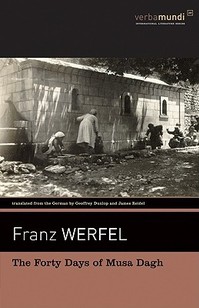
Dr. Vahram Shemmassian is an associate professor and the director of the Armenian Studies Program at California State University, Northridge. He is the foremost scholar on Musa Dagh the site of the famed resistance during the Armenian genocide.
Professor Shemmassian will talk about the resistance and the genocide in his presentation "The Musa Dagh Resistance to the Armenian Genocide and Its Impact through Franz Werfel's Historical Novel The Forty Days of Musa Dagh."
Franz Werfel (1890-1945), Austrian poet, modernist playwright, and novelist, was born in Prague, the son of a Jewish merchant. During World War I, Werfel served for several years on the Russian front as a soldier in the Austrian army. His novel The Forty Days of Musa Dagh published in 1933 detailed the mass murder and expulsion of Armenians from eastern Anatolia in 1915. The novel received much attention in the United States standing as a warning against future acts of mass murder and won lasting respect from Armenian communities throughout the world.
Sponsored by: The Institute for Global Studies, Center for Austrian Studies, Center for Holocaust & Genocide Studies, College of Liberal Arts, Critical Asian Studies, Study of the Asias.
7:00 p.m.
President's Room
Coffman Memorial Union

Dr. Vahram Shemmassian is an associate professor and the director of the Armenian Studies Program at California State University, Northridge. He is the foremost scholar on Musa Dagh the site of the famed resistance during the Armenian genocide.
Professor Shemmassian will talk about the resistance and the genocide in his presentation "The Musa Dagh Resistance to the Armenian Genocide and Its Impact through Franz Werfel's Historical Novel The Forty Days of Musa Dagh."
Franz Werfel (1890-1945), Austrian poet, modernist playwright, and novelist, was born in Prague, the son of a Jewish merchant. During World War I, Werfel served for several years on the Russian front as a soldier in the Austrian army. His novel The Forty Days of Musa Dagh published in 1933 detailed the mass murder and expulsion of Armenians from eastern Anatolia in 1915. The novel received much attention in the United States standing as a warning against future acts of mass murder and won lasting respect from Armenian communities throughout the world.
Sponsored by: The Institute for Global Studies, Center for Austrian Studies, Center for Holocaust & Genocide Studies, College of Liberal Arts, Critical Asian Studies, Study of the Asias.
Labels:
"Armenian Genocide",
"Franz Werfel",
homepage,
Ohanessian
Tuesday, October 1, 2013
Subscribe to:
Comments (Atom)
© Regents of the University of Minnesota. All rights reserved. Equal opportunity educator and employer.